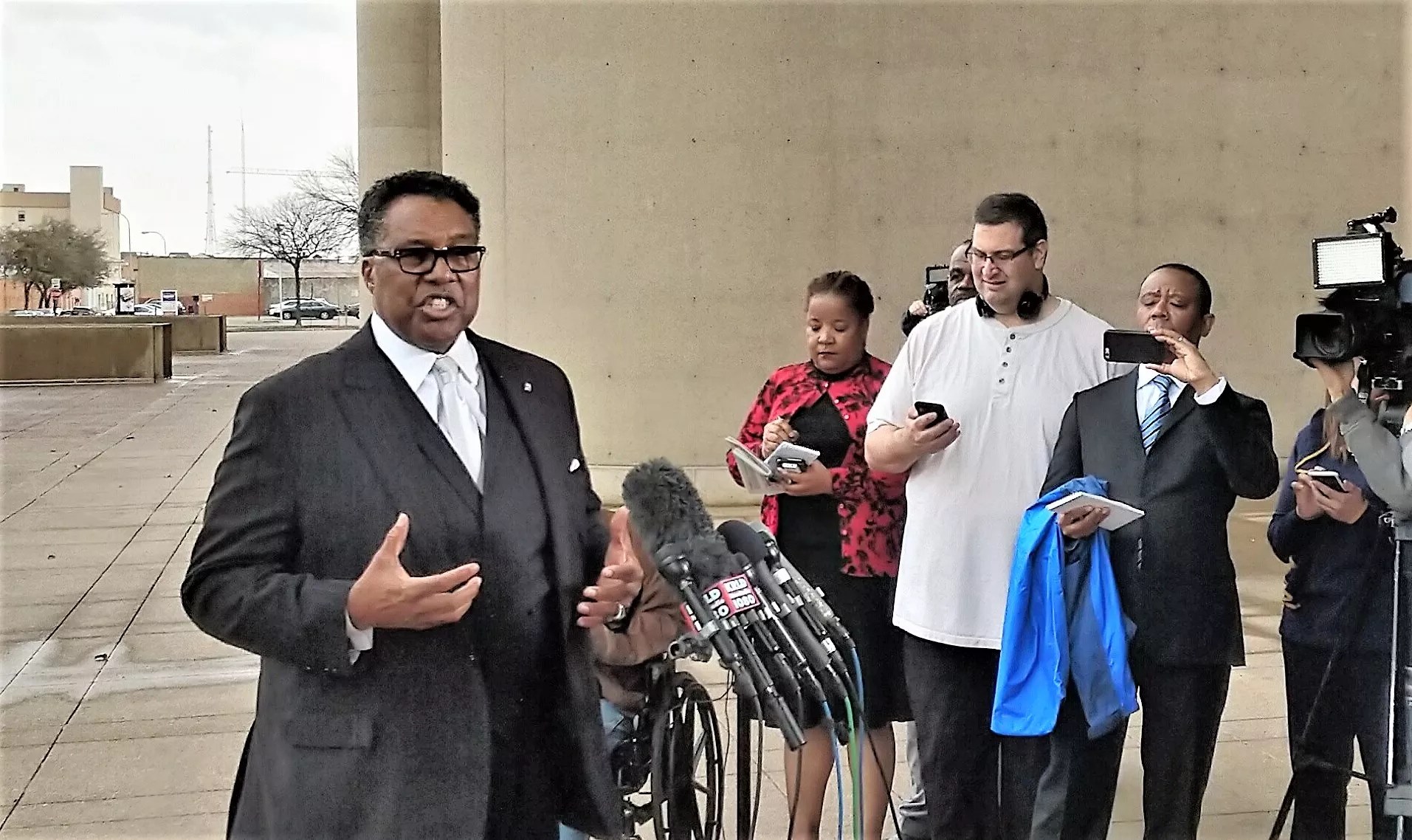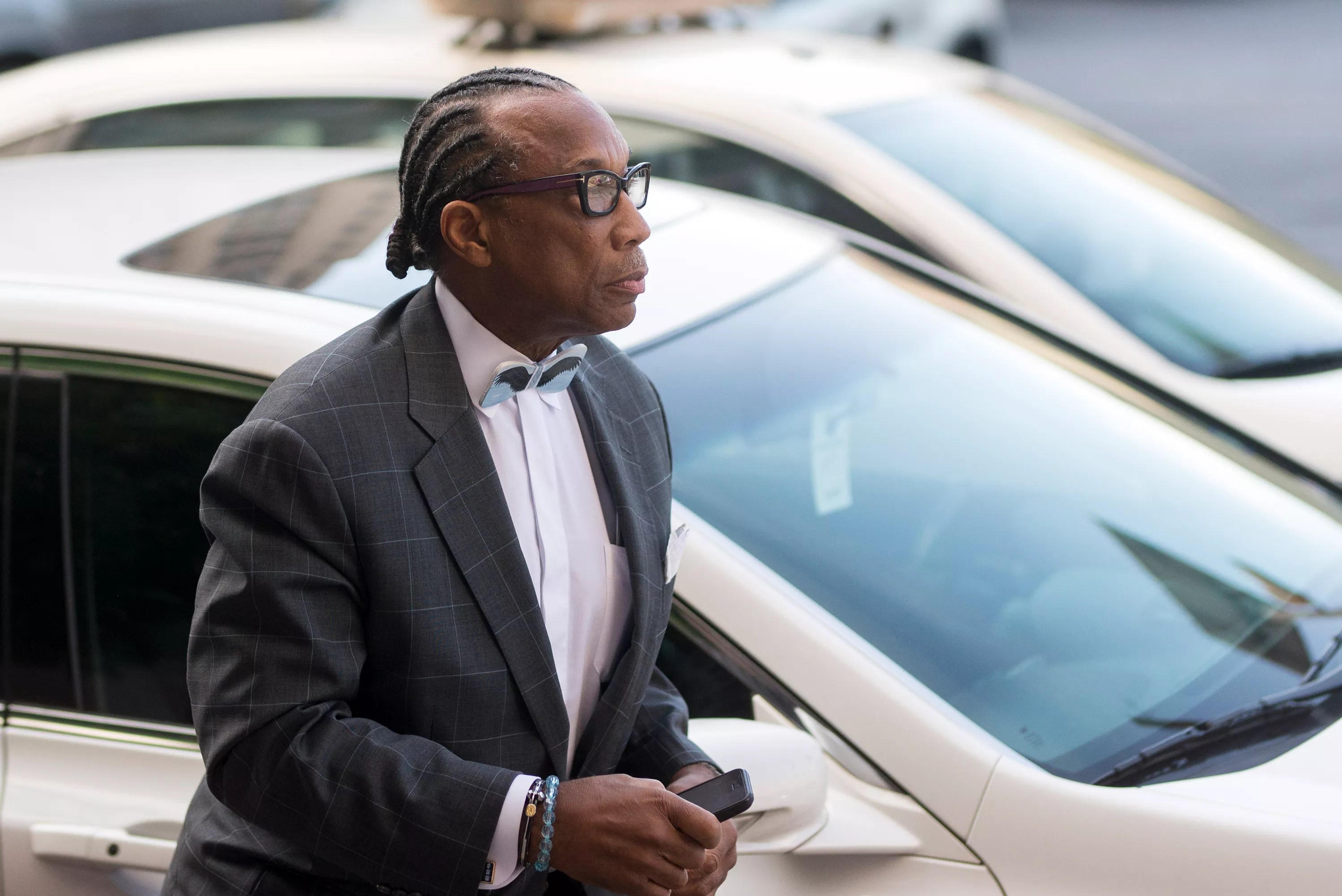
Stephen Young

Audio By Carbonatix
Today the Dallas City Council goes into closed-door executive session, away from the eyes and ears of the taxpayers, to decide if the taxpayers should pick up the tab for the legal defense of City Council member Dwaine Caraway, who has been accused in a lawsuit of racketeering.
Get out your checkbooks.
There’s a good chance the answer will be yes, you must pay to defend Caraway. Why? Because Caraway, as an elected official, is City Hall, and City Hall is the only defendant in the lawsuit with deep pockets. Your pockets.
That’s one good reason, of several, that Caraway is in the lawsuit: to open up your pockets. That’s why you have to get your checkbook out. The only way you can protect your pockets may be by defending Caraway against charges he’s a racketeer. What can you say about that?
Thank you, Dwaine Caraway.
The lawsuit (see below) is brought by a committee that was set up by the state Legislature to try to recover money stolen from an entity called Dallas County Schools. We talked about this Monday. DCS didn’t have any schools. It leased buses to real school districts.
There’s a good chance the answer will be yes, you must pay to defend Caraway. Why? Because Caraway, as an elected official, is City Hall, and City Hall is the only defendant in the lawsuit with deep pockets. Your pockets.
In recent federal criminal proceedings, the former superintendent of DCS and a Louisiana businessman have pleaded guilty in a plot the government claims defrauded DCS of $125 million. Last November the Legislature gave Dallas County voters the ability to abolish DCS in a referendum, and that’s what voters did. Then the Legislature set up something called the Dissolution Committee to sell off DCS assets and collect debts.
In a lawsuit filed last month, the Dissolution Committee names Caraway as one of eight individuals it says conspired to defraud DCS of $125 million in cash and real estate. The suit makes specific reference to Caraway’s successful efforts to persuade colleagues on the City Council to vote approval of what turned out to be a key element in the conspiracy.
Here’s the thing about that: Some very worried people at City Hall are telling me it’s all about whether Caraway acted for DCS on his own as a private individual or in his capacity as an elected official.
If he was acting on his own, then he’s on his lonesome. The city would be immune from damages, and Caraway would pay for his own defense. But if, as the suit claims, he was acting as a City Council member, working to persuade other council members to vote in a way that enabled the fraud, then the city’s on the hook for damages.
A few things remain unclear to me. I tried to work them out with people at City Hall who would talk to me – none on the record because of the pending litigation – but I never got to satisfactory answers.
First: The issue the council will hear in its secret session today, as I understand it, is this: Should the city turn its back on Caraway, tell him it’s his fish to fry, with the city thereby taking the risk, by staying out of it, that the Dissolution Committee will succeed in persuading the court to pry open the city’s coffers? Or should the city jump in and defend Caraway to protect its own pockets?
Why couldn’t the city just jump in to protect itself? In other words, why couldn’t the city get into it somehow to argue that Caraway was not acting in an official capacity and therefore the city is immune, whether he’s guilty or not?
Or, wait a minute. Is that horse already out of the barn? There is videotape, audio and other record of Caraway talking the council into voting for a 25-year extension of the contract at the center of the fraud, while Caraway was receiving payments from the fraudsters.
Caraway has argued publicly that the payments were for other work unrelated to the fraud. But maybe there is no feasible way to make the act itself – lobbying the council – not an official act.
In that case – if Caraway is in this jackpot as an elected official – then the city is in the jackpot with him and must defend him to defend itself. And it gets even thornier.
No criminal charges have been brought against Caraway, Robert Leonard, owner of the company at the center of the fraud charges, or Larry Duncan, a former Dallas City Council member who is also the former elected president of the board of trustees of DCS. And yet Caraway and Duncan, as elected officials, and Leonard, as owner, normally would be the prime targets for federal criminal prosecutors.
The concern of the worried onlookers at City Hall is that they are. The feds could be weaving together other evidence and flipping witnesses in preparation for a criminal racketeering case.

Dallas County Commissioner John Wiley Price beat the feds in a massive corruption prosecution last year. Does that mean it’s easy?
Brian Maschino
If that’s the case, then the $125 million lawsuit, which references federal RICO and racketeering statutes again and again, is much more than merely a collection effort. It’s scooping up ammo for the shoe many observers think is still bound to drop, a criminal case against Caraway, Duncan and Leonard.
There we come to yet another complication the City Council must consider today behind closed doors. If a criminal case is anywhere close to a real possibility, Caraway must be extremely careful how he answers questions in the civil matter. In fact, he shouldn’t answer at all.
And he doesn’t have to. The Fifth Amendment of the Constitution gives him that right. He can say, “You guys are just putting me on the stand in the civil case so you can use what I say here to jam me up later on a criminal charge. Well, I refuse to incriminate myself. I take the Fifth.”
Mailman: “Hey, Councilman, good morning! You hangin’ in there?” Caraway, mumbling through a toothy smile: “… insist … right … not to incriminate….”
But guess what? If he does that, it’s what is called in civil matters a default. By refusing to answer questions, he is refusing to answer the lawsuit itself. By refusing to answer the complaint against him in the suit, he defaults. It’s the civil equivalent of a guilty plea or a no contest. You give up.
Guess what again? If Caraway gives up, he gives us up. The coffers are open for business. He defaults, we default. If he is tried in his official capacity as an elected member of city government and he gives up, the city is wide open to a deep-pockets recovery.
So here is the second thing I don’t get and couldn’t get an answer to: Why would Caraway trust the city to defend him, anyway? How does anybody figure that his interests and the city’s interests even align?
The city doesn’t want to have to pay money. Caraway doesn’t want to go to prison. Those are two different things.
If I were Caraway, I would much rather keep my mouth shut and not go to prison than save the taxpayers a couple hundred million bucks. Small price to pay, for me, anyway.
Caraway’s ceremonial title on the council is mayor pro tem. The last guy from his part of town who had that title died of cancer serving an 18-year federal sentence for bribery. Federal law wants to be very tough on elected officials convicted of corruption.
So let’s say the city provides Caraway with a lawyer. The feds start asking him questions under oath that traipse into matters that could go criminal later. What does the city-paid lawyer tell him to do?
This? “Take the Fifth, Dwaine. This is your life. To hell with the taxpayers.”
Or this? “Go ahead and answer the question, Dwaine. It’ll be OK, probably, pretty much for sure, I think.”
If I were Caraway, I wouldn’t even need a lawyer. I’d just start taking the Fifth as soon as I stepped out of the house every morning.
Mailman: “Hey, Councilman, good morning! You hangin’ in there?”
Caraway, mumbling through a toothy smile: “… insist … right … not to incriminate….”
I’d have cards printed saying that. I would give them to my own family if they tried to talk to me.
One last possible factor. Note that I said above that federal law wants to be tough on corrupt elected officials. Wants to. But the last time the feds went after an elected official with a major prosecution here, they came up with a goose egg, a black eye and some teeth knocked out.
Sixteen months ago Dallas County Commissioner John Wiley Price vanquished the feds in a criminal conspiracy case that was the product of decades of intense federal effort. Stunning outcomes like that change things. The question is how.
Does it mean it’s easy to beat the feds here? Or does it mean the feds won’t come here with a case next time until they’re sure they’re bulletproof, and maybe that’s what they’re doing now?
In either case, what does the City Council do today? What would you do? Cut Caraway loose? Or bite the bullet and vote to defend him?
You might ask this question: Why in the hell is it up to the council? This all sounds like a terribly complex legal matter, ins and outs all over the place. Why isn’t it up to lawyers? Isn’t the council what got us into this mess in the first place?
Yup. Welcome to democracy. Sorry to be a broken record, but we do have a group of former and current council members who are hawks about this stuff – the young progressives. This is why they are so important.
NOTE: 2:30 PM 8/8/2018. CONSIDERATION OF CITY-PAID LEGAL COUNSEL FOR CARAWAY HAS BEEN POSTPONED INDEFINITELY FOR FURTHER STUDY.
Dallas Bribery by Jim Schutze on Scribd